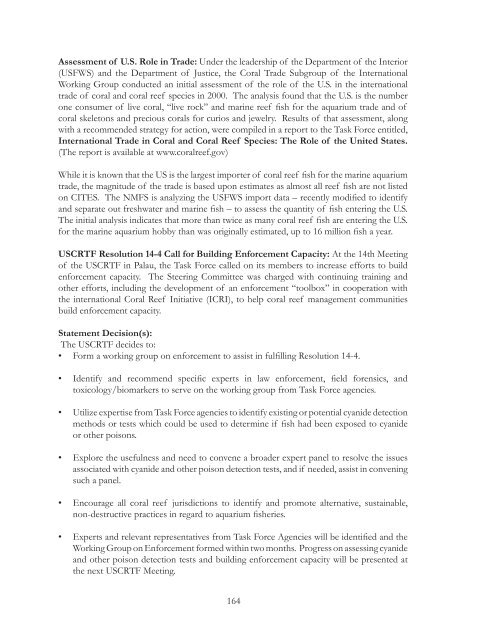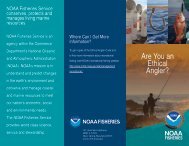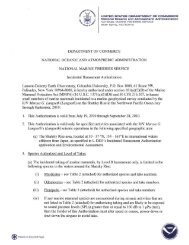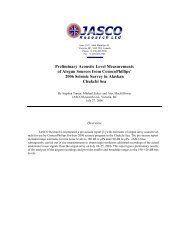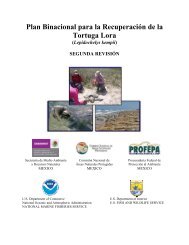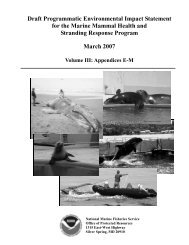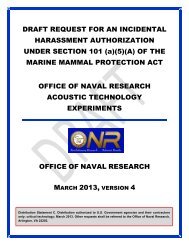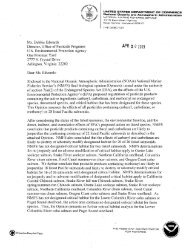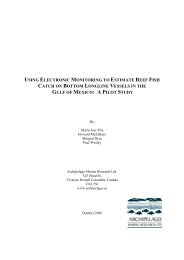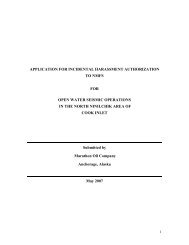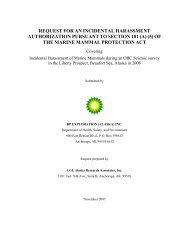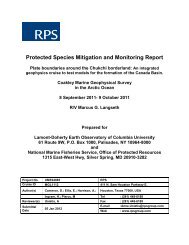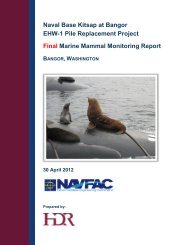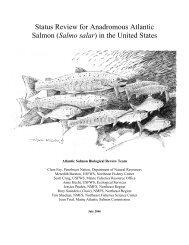Proceedings of the International Cyanide Detection Testing Workshop
Proceedings of the International Cyanide Detection Testing Workshop
Proceedings of the International Cyanide Detection Testing Workshop
You also want an ePaper? Increase the reach of your titles
YUMPU automatically turns print PDFs into web optimized ePapers that Google loves.
Assessment <strong>of</strong> U.S. Role in Trade: Under <strong>the</strong> leadership <strong>of</strong> <strong>the</strong> Department <strong>of</strong> <strong>the</strong> Interior<br />
(USFWS) and <strong>the</strong> Department <strong>of</strong> Justice, <strong>the</strong> Coral Trade Subgroup <strong>of</strong> <strong>the</strong> <strong>International</strong><br />
Working Group conducted an initial assessment <strong>of</strong> <strong>the</strong> role <strong>of</strong> <strong>the</strong> U.S. in <strong>the</strong> international<br />
trade <strong>of</strong> coral and coral reef species in 2000. The analysis found that <strong>the</strong> U.S. is <strong>the</strong> number<br />
one consumer <strong>of</strong> live coral, “live rock” and marine reef fi sh for <strong>the</strong> aquarium trade and <strong>of</strong><br />
coral skeletons and precious corals for curios and jewelry. Results <strong>of</strong> that assessment, along<br />
with a recommended strategy for action, were compiled in a report to <strong>the</strong> Task Force entitled,<br />
<strong>International</strong> Trade in Coral and Coral Reef Species: The Role <strong>of</strong> <strong>the</strong> United States.<br />
(The report is available at www.coralreef.gov)<br />
While it is known that <strong>the</strong> US is <strong>the</strong> largest importer <strong>of</strong> coral reef fi sh for <strong>the</strong> marine aquarium<br />
trade, <strong>the</strong> magnitude <strong>of</strong> <strong>the</strong> trade is based upon estimates as almost all reef fi sh are not listed<br />
on CITES. The NMFS is analyzing <strong>the</strong> USFWS import data – recently modifi ed to identify<br />
and separate out freshwater and marine fi sh – to assess <strong>the</strong> quantity <strong>of</strong> fi sh entering <strong>the</strong> U.S.<br />
The initial analysis indicates that more than twice as many coral reef fi sh are entering <strong>the</strong> U.S.<br />
for <strong>the</strong> marine aquarium hobby than was originally estimated, up to 16 million fi sh a year.<br />
USCRTF Resolution 14-4 Call for Building Enforcement Capacity: At <strong>the</strong> 14th Meeting<br />
<strong>of</strong> <strong>the</strong> USCRTF in Palau, <strong>the</strong> Task Force called on its members to increase efforts to build<br />
enforcement capacity. The Steering Committee was charged with continuing training and<br />
o<strong>the</strong>r efforts, including <strong>the</strong> development <strong>of</strong> an enforcement “toolbox” in cooperation with<br />
<strong>the</strong> international Coral Reef Initiative (ICRI), to help coral reef management communities<br />
build enforcement capacity.<br />
Statement Decision(s):<br />
The USCRTF decides to:<br />
• Form a working group on enforcement to assist in fulfi lling Resolution 14-4.<br />
•<br />
•<br />
•<br />
•<br />
•<br />
Identify and recommend specifi c experts in law enforcement, fi eld forensics, and<br />
toxicology/biomarkers to serve on <strong>the</strong> working group from Task Force agencies.<br />
Utilize expertise from Task Force agencies to identify existing or potential cyanide detection<br />
methods or tests which could be used to determine if fi sh had been exposed to cyanide<br />
or o<strong>the</strong>r poisons.<br />
Explore <strong>the</strong> usefulness and need to convene a broader expert panel to resolve <strong>the</strong> issues<br />
associated with cyanide and o<strong>the</strong>r poison detection tests, and if needed, assist in convening<br />
such a panel.<br />
Encourage all coral reef jurisdictions to identify and promote alternative, sustainable,<br />
non-destructive practices in regard to aquarium fi sheries.<br />
Experts and relevant representatives from Task Force Agencies will be identifi ed and <strong>the</strong><br />
Working Group on Enforcement formed within two months. Progress on assessing cyanide<br />
and o<strong>the</strong>r poison detection tests and building enforcement capacity will be presented at<br />
<strong>the</strong> next USCRTF Meeting.<br />
164


